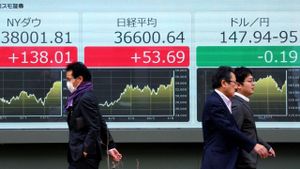Egypt is gearing up for substantial economic growth through increased cooperation with Ukraine, particularly focusing on agricultural trade and the burgeoning field of water desalination. Recent discussions between officials from both countries indicate strong prospects for growth and collaboration which could redefine their trade relations.
Vitaliy Koval, Ukraine's Minister of Agricultural Policy and Food, disclosed during a meeting organized by the Egyptian Businessmen Association, "There are prospects for doubling the trade volume between the two countries through cooperation between business organizations, embassies, and governments." This sentiment reflects mutual confidence, as both nations seek to deepen economic ties.
Last year, the agricultural trade volume between Egypt and Ukraine reached approximately $1.5 billion, signaling significant engagement. Koval highlighted the importance of eliminating barriers, particularly concerning veterinary, phytosanitary, and customs certifications, to facilitate smoother trade. He also pointed out the need for joint initiatives to secure financing sources for commercial and investment activities.
Mustafa Al-Najari, the head of the Agriculture Committee of the Egyptian Businessmen Association, echoed Koval’s excitement by stating, "There are great opportunities for investment and joint economic cooperation in grain storage, vegetable oil extraction, and food processing." This insight emphasizes the areas ripe for investment, presenting potential growth sectors.
The discussion around extending the ties doesn’t end with agriculture. Egypt is also ramping up its efforts to manage water resources efficiently. Dr. Mustafa Madbouli, Egypt’s Prime Minister, recently stated the government's ambitions to produce over 5 million cubic meters of desalinated water daily. He explained, "The larger the project, the lower the cost. This means we must focus on large-scale endeavors to maximize efficiency and affordability."
To achieve these ambitious targets, Madbouli indicated the need for collaboration with major companies capable of delivering comprehensive strategies. The ultimate goal is to boost local production of desalination components, reducing dependency on foreign supplies.
Ukraine’s investment potential remains vast, especially with its 32% surge in agricultural exports to Egypt last year, totaling about $1.4 billion. The country’s ability to export 84% of its agricultural products through efficient Black Sea and Danube ports has garnered attention for enhancing trade performance.
With 50 Egyptian companies already established within Ukraine for the distribution and marketing of agricultural products, the emphasis on direct shipping lines between Egypt and Ukraine could significantly boost the volume of exports. Al-Najari shared thoughts on the necessity of enhancing logistics to streamline this initiative.
The Egyptian government is optimistic about fostering conditions favorable for foreign investment, evident from its strategic meetings and dialogues aimed at strengthening partnerships. The overarching theme during these exchanges is the immense potential for collaboration across various sectors, including agriculture, infrastructure, and urban development.
Through events like this latest meeting with Koval, the proactive approach taken by both nations reflects awareness of today’s economic dynamics and the synergistic benefits of working together. The prospect of using Egypt’s strategic geographical position to increase exports to Europe and beyond remains attractive.
Madbouli’s insights on boosting local production and engaging large corporations reiterate the importance of self-sufficiency, particularly as water scarcity issues grow more pressing. The integration of advanced desalination practices might just be the key to combating these challenges moving forward.
With both countries steering concerted initiatives, the momentum generated by these dialogues might very well lead to enhanced agricultural exports, increased investments, and collaborative economic strategies, beneficial for each party involved.
Looking toward the future, the continued commitment to mutual investment and cooperation seems likely to yield substantial benefits, reshaping the economic landscapes of both Egypt and Ukraine alike.



